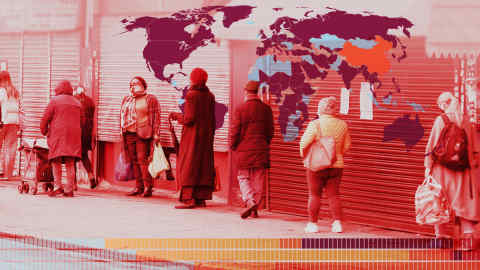[ad_1]
New York and neighbouring states New Jersey and Connecticut will lift most coronavirus-related restrictions on businesses by mid-May, underscoring how the virus is in retreat in one of the regions hit hardest at the start of the pandemic.
Capacity restrictions on offices, theatres, museums and businesses including retailers, bars and gyms will be scrapped in the three states from May 19, Andrew Cuomo, New York’s governor, said at a press conference on Monday.
The co-ordinated reopening mirrors steps the three states took last year close parts of their economy as they dealt with a surge in coronavirus infections during the first wave of the pandemic.
It is the latest sign of how infections in the densely populated region, as well as the US more generally, are declining sharply as the country races to distribute vaccines.
The number of new Covid-19 infections hit a peak of about 95 per 100,000 people a day in New York on January 12, and has since fallen to a per capita rate of about 17, according to US Centers for Disease Control and Prevention data.
To assist with the reopening of the economy, New York City is set to again be served by a 24/7 subway system for the first time in more than a year.
The subway will revert to round-the-clock service from May 17. The move will reverse the decision in early May last year by the Metropolitan Transportation Authority, which operates the subway, to close the network between 1am and 5am to implement enhanced cleaning and disinfecting of carriages and stations.
Individual businesses will be allowed to make their own decisions on capacity limits and some parts of the city will take longer to spring back to life, like Broadway, which is unlikely to reopen quickly because of the long lead time needed to prepare a show.
While the three states “don’t have identical policies because we are in slightly different situationsâ€, Cuomo said, the steps to reopen would “complement each otherâ€.
Bill de Blasio, New York City mayor, previously said he planned to have the metropolis “fully reopen†on July 1.
After a devastating winter wave of the disease, cases across the US have been falling. According to CDC data, the seven-day average of new coronavirus infections fell below 50,000 over the weekend for the first time since early October, and is down 80 per cent from its January peak. The average of daily deaths has hovered between about 630 and 720 a day for the past month, the lowest rates since early July.
Some other states have already phased out or lifted many state-mandated restrictions altogether, including Texas and Arizona. California lifted a stay-at-home order at the end of January, and its most populous county, Los Angeles, has eased more business restrictions in recent weeks as a jump in cases has subsided.
Florida lifted almost all pandemic-era restrictions in September but at that time allowed local authorities to limit restaurant capacity by as much as half. Ron DeSantis, Florida governor, who has been a vocal critic of strict lockdowns, signed a bill that puts new curbs on officials’ emergency powers during a pandemic, effectively ending all local restriction in his state.
The bill, which also bans the use of “vaccine passportsâ€, will take effect on July 1. However, DeSantis plans to issue an executive order suspending local rules until then.
“I think that’s the evidence-based thing to do,†DeSantis said during a news conference at a St Petersburg restaurant. “I think folks that are saying they need to be policing people at this point, if you’re saying that, then you’re really saying you don’t believe in the vaccines.â€
Businesses can still implement their own protocols such as insisting that customers wear masks, DeSantis said.
The rapid decline in cases has come amid a big push by states and the Biden administration to distribute vaccines as quickly as possible. The US has administered nearly 247m vaccine doses so far, well above president Joe Biden’s goal of administering 200m vaccine doses within his first 100 days in office. More than 44 per cent of Americans have received at least one shot and 31.8 per cent of adults are now fully vaccinated.
After an initial rush, some states are experiencing a fall in demand for jabs. Officials are trying to lure in reluctant people with incentives including promises of relaxed restrictions, savings bonds and even free beers.
Despite progress in infections on the national level, some areas of the country are still trying to control fresh outbreaks. Oregon, which borders California, deemed 15 counties an “extreme risk†and instituted a three-week lockdown, shuttering gyms and indoor dining, after a surge in cases.
[ad_2]
Source link





